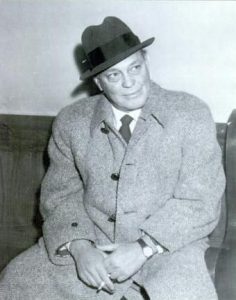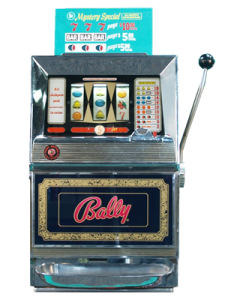As a businessman in the coin-op industry in Brooklyn, New York during the mid-21st century Irving Kaye had many business dealings with people who have been connected with organized crime. Irving Kaye was not a mob member, he was a “Friend” of some notorious mobsters. Most notably, according to the FBI, Irving Kaye got his start in the coin-op business in 1953 as part of Longy Zwillman’s crew in NYC and later in 1975 Mr. Kaye, who was then a major shareholder and a Board Member of Bally Manufacturing (aka Bally slot machines and casino’s), was denied a casino operators license in Nevada because of his previous “business” relationships with Gerard Catena who was a powerful member of the Vito Genovese mafia family.
Irving Kaye, Longy Zwillman and Gerardo Catena
In May of 1953 an FBI file on Abner “Longy” Zwillman reported that Zwillman had some of his men in New York City were easing their way into the automatic vending machine business. The informant to the FBI advised them that one of these men was alleged to be Irving Kaye. It was in 1953 that Irving Kaye established Kaye Manufacturing and begun making coin-op kiddie rides distributed by Runyon Sales.
- Abner “Longie” Zwillman – Back in the early days of prohibition Longie Zwillman was responsible, according to the Kefauver Committee, for about 40% of all illegal liquor in the United States between 1926 and 1933, unloading most of his supplies along the Jersey coast. Zwillman was one of Newark NJ’s most notorious gangsters of the Prohibition era and one of the organizers and a founding member of the National Crime Syndicate and Murder Incorporated. According to FBI files it was Longie that got Irving Kaye started in the coin-op business as one of his soldiers in New York City. Longie died in 1959 after was summonsed to appear before the McClellan panel at the Valachi hearings. Longie suspiciously committed “suicide” by hanging himself in his basement with his hands tied behind his back.
In 1959 after Zwillman suspiciously committed suicide most of his rackets were taken over by his former lieutenant Gerardo “Jerry” Catena who had by that time become a capo in the Vito Genovese crime family. In 1975 it was revealed by the Nevada Casino Commission that Catena had been business partners up until 1971 and remained close friends with Irving Kaye.
-

Gerardo “Jerry” Catena (January 2, 1902 – 2000) was a New York mobster and a top member of the Genovese crime family during the 1950s and 1960s. After the imprisonment of Genovese in 1959, a “Committee/Ruling Panel” was to run the Genovese crime family, which consisted of Catena, Philip “Benny Squint” Lombardo, Thomas Eboli and Michele Miranda. This administration continued to run the family throughout the 1960s and early 1970s, as Catena was indicted in 1970, and jailed from 1971 to 1972.
Gerardo “Jerry” Catena – One of Zwillman’s young lieutenants, Gerald “Jerry” Catena, was also friends with Lucky Luciano and Meyer Lansky. Like Zwillman, Catena was from Newark, involved in the trucking business and the longshoreman’s union and later served as an underboss in the Vito Genovese mafia family. In 1946 Catena formed Runyon Sales with Abe Green and Barney Sugarman to distribute Lion pinball machines in New Jersey. Catena was what the mob calls an “earner,” as his pinball machines could be found in every pool hall, bowling alley and mom and pop grocery store in every town in New Jersey. When Vito Genovese the “Boss of Bosses” was sentenced to 15 years in prison in 1960, there was considerable speculation as to who would replace the mob boss, but instead of a mob war breaking out, Catena was given the responsibility for the family’s New Jersey operations, while Thomas Eboli ran the New York side of their family’s business. When the office of Angelo “Gyp” DeCarlo was wiretapped, DeCarlo was overheard saying that “Catena has more money than anybody, except Meyer Lansky”
The Bally Manufacturing Deal

The Bally “Money Honey” electro-mechanical slot machine revolutionized the casino business. Brought to life while Irving Kaye was on the board-of-directors for Bally, this machine was instrumental in Bally’s 90% market share control of casino slots in the late 1960s.
In 1962 William T. (Bill) O’Donnell then the sales manager of Lions Equipment Corp (later renamed Bally) approached Barney Sugarman and Abe Green, Sam Klein and Irving Kaye with a request to raise money to buy Bally. In order to get the financing needed to raise the $1.2M Barney “Shugy” Sugarman reached out to his “silent” partner in Runyon Sales Company, Gerardo Catena. The deal was done with a loan from the teamsters union. Bill O’Donnell became Bally’s CEO and Abe Green and Irving Kaye were put on the Bally board of Directors and Mr. Klein was Bally’s largest stockholder and a vice president.
By 1969 Bally controlled 90 percent of the Vegas slot-machine market and Bally went public as the first gaming business to listed on the New York Stock Exchange and a second public offering was also made in 1971. Later it was reported that Irving Kaye used some of his proceeds from this offering to buy out Catena’s ownership interests of Irving Kaye Co. Inc.
In 1975 Bill O’Donnell, Sam Klein and Irving Kaye applied for a gaming license in Nevada for Bally’s. O’Donnell and Klein’s applications were granted but Irving Kaye’s Nevada gaming license was denied due to his “numerous business relationships over a period of years with Gerard Catena”.
During the 60’s and 70’s Irving Kaye and his sons Howard and Arnold continued operating Irving Kaye Co., Inc. making some of the best “bar box” coin-op pool tables ever made. Irving Kaye passed away in Boca Raton, FL in December 1976.
In 1978 when Bally applied for a casino license in Atlantic City, NJ both Klein and O’Donnell were forced to divest their holdings before Bally would be licensed to operate a casino in New Jersey. It was determined that O’Donnell was well aware of Catena’s ownership interests in Runyon and Irving Kaye as far back as 1964. The Casino Control Board investigators also turned up a photograph of Klein playing golf with Catena at Clarence Geist’s exclusive Boca Raton resort in Florida. Klien reported that he did not know Catena and that they had only just recently met while visiting a sick friend (Irving Kaye) and they played golf together shortly thereafter.
Source:
- http://njlegallib.rutgers.edu/njar/v10/p0356.pdf (see pg 15-19)